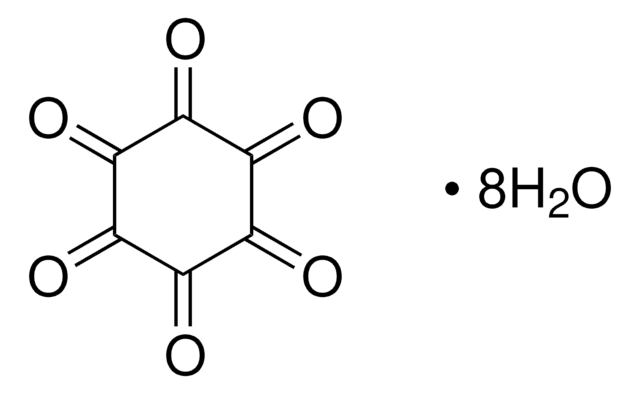230898
Antimony(III) oxide
powder, 5 μm, ReagentPlus®, 99%
Sinónimos:
Diantimony trioxide
Iniciar sesiónpara Ver la Fijación de precios por contrato y de la organización
About This Item
Fórmula lineal:
Sb2O3
Número de CAS:
Peso molecular:
291.52
EC Number:
MDL number:
UNSPSC Code:
12352303
eCl@ss:
38080202
PubChem Substance ID:
NACRES:
NA.23
Productos recomendados
Quality Level
product line
ReagentPlus®
assay
99%
form
powder
particle size
5 μm
bp
1550 °C (lit.)
mp
655 °C (lit.)
SMILES string
O=[Sb]O[Sb]=O
InChI
1S/3O.2Sb
InChI key
ADCOVFLJGNWWNZ-UHFFFAOYSA-N
¿Está buscando productos similares? Visita Guía de comparación de productos
application
- Thermal Decomposition and Carbothermal Reduction: Examines the recycling and purification processes of Antimony(III) oxide from metal oxides, valuable for those interested in sustainable metallurgy (Karlsson et al., 2018).
- Oxidation of Antimony(III) in Soil by Manganese(IV) Oxide: Studies the interaction between manganese oxide and antimony(III) oxide in soils, providing insights into environmental chemistry and soil remediation (Fu et al., 2018).
- Adsorption of Antimony(V) onto Mn(II)-Enriched Surfaces: Focuses on how manganese oxide interacts with antimony(V), relevant for those studying adsorption processes and water treatment technologies (Liu et al., 2015).
- Kinetic Modeling of Antimony(III) Oxidation and Sorption in Soils: Provides a kinetic model of antimony(III) interactions with environmental matrices, useful for environmental scientists and chemists involved in pollution control (Cai et al., 2016).
Legal Information
ReagentPlus is a registered trademark of Merck KGaA, Darmstadt, Germany
signalword
Warning
hcodes
Hazard Classifications
Carc. 2
Storage Class
13 - Non Combustible Solids
wgk_germany
WGK 1
flash_point_f
Not applicable
flash_point_c
Not applicable
ppe
Eyeshields, Gloves, type P3 (EN 143) respirator cartridges
Elija entre una de las versiones más recientes:
¿Ya tiene este producto?
Encuentre la documentación para los productos que ha comprado recientemente en la Biblioteca de documentos.
Los clientes también vieron
David Kirkland et al.
Mutation research, 627(2), 119-128 (2006-12-19)
Antimony trioxide (Sb2O3, CAS 1309-64-4) is widely used as a flame retardant synergist in a number of household products, as a fining agent in glass manufacture, and as a catalyst in the manufacture of various types of polyester plastics. It
Lisa Bregoli et al.
Toxicology, 262(2), 121-129 (2009-06-02)
Nanoparticles (NPs) are materials with one dimension in the range of 1-100 nm. The toxicity of NPs remains widely unknown and still poses concerns, due to the peculiar characteristics of materials in the nano-size range. We analyze the toxicity of
Susan Lösler et al.
Annals of hematology, 88(11), 1047-1058 (2009-03-21)
During the last years remission rates of more than 72% for arsenic(III)-oxide (As(2)O(3)) treatment in relapsed or refractory acute promyelocytic leukemia have been published. As(2)O(3) is under clinical investigation for therapy of leukemia and solid tumors. Due to the chemical
Koen Oorts et al.
Environmental science & technology, 42(12), 4378-4383 (2008-07-09)
Antimony trioxide (Sb2O3) is a widely used chemical that can be emitted to soil. The fate and toxicity of this poorly soluble compound in soil is insufficiently known. A silt-loam soil (pH 7.0, background 0.005 mmol Sb kg(-1)) was amended
N Gurnani et al.
Biological trace element research, 37(2-3), 281-292 (1993-05-01)
Comparison of the clastogenic effects of antimony and bismuth used as trioxides, when administered orally by gavaging to laboratory bred male mice, showed that the former was more strongly clastogenic than the latter. Three doses of each chemical (400, 666.67
Nuestro equipo de científicos tiene experiencia en todas las áreas de investigación: Ciencias de la vida, Ciencia de los materiales, Síntesis química, Cromatografía, Analítica y muchas otras.
Póngase en contacto con el Servicio técnico












